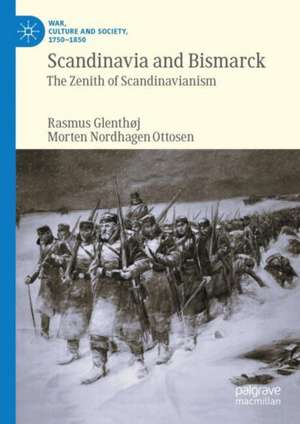Scandinavia and Bismarck: The Zenith of Scandinavianism: War, Culture and Society, 1750–1850
Autor Rasmus Glenthøj, Morten Nordhagen Ottosenen Limba Engleză Hardback – 14 mai 2024
Din seria War, Culture and Society, 1750–1850
- 20%
 Preț: 691.14 lei
Preț: 691.14 lei - 15%
 Preț: 694.87 lei
Preț: 694.87 lei - 15%
 Preț: 705.18 lei
Preț: 705.18 lei - 15%
 Preț: 705.99 lei
Preț: 705.99 lei - 15%
 Preț: 587.20 lei
Preț: 587.20 lei - 15%
 Preț: 640.88 lei
Preț: 640.88 lei -
 Preț: 202.05 lei
Preț: 202.05 lei -
 Preț: 388.72 lei
Preț: 388.72 lei - 15%
 Preț: 644.95 lei
Preț: 644.95 lei - 18%
 Preț: 791.88 lei
Preț: 791.88 lei - 15%
 Preț: 647.40 lei
Preț: 647.40 lei -
 Preț: 196.88 lei
Preț: 196.88 lei -
 Preț: 385.08 lei
Preț: 385.08 lei -
 Preț: 396.62 lei
Preț: 396.62 lei -
 Preț: 213.58 lei
Preț: 213.58 lei - 15%
 Preț: 645.79 lei
Preț: 645.79 lei - 15%
 Preț: 699.28 lei
Preț: 699.28 lei - 18%
 Preț: 895.45 lei
Preț: 895.45 lei - 18%
 Preț: 729.53 lei
Preț: 729.53 lei - 15%
 Preț: 637.75 lei
Preț: 637.75 lei -
 Preț: 396.40 lei
Preț: 396.40 lei -
 Preț: 388.13 lei
Preț: 388.13 lei - 15%
 Preț: 698.94 lei
Preț: 698.94 lei - 15%
 Preț: 646.43 lei
Preț: 646.43 lei - 15%
 Preț: 642.18 lei
Preț: 642.18 lei -
 Preț: 383.93 lei
Preț: 383.93 lei - 15%
 Preț: 700.61 lei
Preț: 700.61 lei - 18%
 Preț: 788.09 lei
Preț: 788.09 lei - 18%
 Preț: 723.38 lei
Preț: 723.38 lei - 15%
 Preț: 535.84 lei
Preț: 535.84 lei - 15%
 Preț: 694.04 lei
Preț: 694.04 lei - 18%
 Preț: 730.35 lei
Preț: 730.35 lei
Preț: 738.37 lei
Preț vechi: 900.45 lei
-18% Nou
Puncte Express: 1108
Preț estimativ în valută:
141.33€ • 153.57$ • 118.80£
141.33€ • 153.57$ • 118.80£
Carte tipărită la comandă
Livrare economică 21 aprilie-05 mai
Preluare comenzi: 021 569.72.76
Specificații
ISBN-13: 9783031465567
ISBN-10: 3031465563
Ilustrații: XII, 493 p.
Dimensiuni: 148 x 210 mm
Greutate: 0.75 kg
Ediția:2024
Editura: Springer International Publishing
Colecția Palgrave Macmillan
Seria War, Culture and Society, 1750–1850
Locul publicării:Cham, Switzerland
ISBN-10: 3031465563
Ilustrații: XII, 493 p.
Dimensiuni: 148 x 210 mm
Greutate: 0.75 kg
Ediția:2024
Editura: Springer International Publishing
Colecția Palgrave Macmillan
Seria War, Culture and Society, 1750–1850
Locul publicării:Cham, Switzerland
Cuprins
1. Scandinavia Before 1814.- 2. Politics in Scandinavia and Europe, 1814-1830.- 3.Politics, Culture and Nationhood.- 4. Nations and Nationalism.- 5. Years of Revolution, 1848-1849.- 6. First Schleswig War and the Constitutional Danish Unitary State.- 7. Scandinavia and the Crimean War.- 8. Scandinavia and the Dano-German Conflict, 1858-1863.- 9. Second Schleswig War, 1864.- 10. Scandinavism in the Aftermath of War, 1865-1871.- 11. Perspectives and Conclusions.
Notă biografică
Rasmus Glenthøj is Associate Professor of History at the University of Southern Denmark.
Morten Nordhagen Ottosen is Professor of History at the Norwegian Defence University College.
Morten Nordhagen Ottosen is Professor of History at the Norwegian Defence University College.
Textul de pe ultima copertă
This book accounts for Scandinavian unification efforts in a time of great upheaval. The ideological repercussions of the European revolutions of 1848-1849 and the Crimean War (1853-1856) transformed both the international political system and nationalism into more ‘realist’ types. The First Schleswig War (1848-1851) having nearly turned into one of Scandinavian unification, the influence of Scandinavianism extended into the Danish, Swedish and Norwegian courts, cabinets and parliaments, attracting interest from the great powers. The Crimean War offered another window of opportunity for Scandinavian unification, before the Danish-German conflict over the duchies of Schleswig and Holstein nearly united Scandinavia upon the outbreak of the Second Schleswig War in 1864. The ultimate failure of Scandinavianism in its unification efforts was not predetermined, although historiography has made it appear as such. Napoleon III, Cavour and Bismarck all actively contributed to plans for Scandinavian unification, the latter even declaring himself as “very strongly Scandinavian”.
Rasmus Glenthøj is Associate Professor of History at the University of Southern Denmark.
Morten Nordhagen Ottosen is Professor of History at the Norwegian Defence University College.
Morten Nordhagen Ottosen is Professor of History at the Norwegian Defence University College.
Caracteristici
Explores how Scandinavianism strongly influenced leading political decision-makers in the 1850s Shows how a united Scandinavia was considered a viable option by Bismarck, Cavour, Napoleon III, and Queen Victoria Accounts for how the Second Schleswig War was nearly a Scandinavian war of unification
